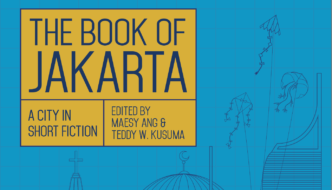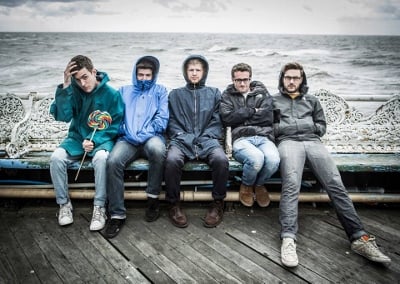TSOTA meets Melvin Burgess ‘the godfather of young adult fiction’
February 21, 2015
[Image courtesy of melvinburgess.net]
TSOTA chatted to acclaimed British children’s writer Melvin Burgess after his workshop at The Carriageworks as part of Breeze Arts Festival. Melvin gained widespread recognition as a writer after the publication of his controversial novel ‘Junk’ (1996) which won the Carnegie Medal and the Guardian Children’s Fiction prize. Before heading back to Hebden Bridge Melvin took time out to tell us why he doesn’t like to do book reviews or ‘slag off’ other writers, what made him a ‘useless’ teenager’ and why he’d like to be remembered as someone that ‘kicked the doors down’ in the literary world.
Here’s what was said…
TSOTA: What did you do before you made it as a writer and if you could have any other career what would it be?
MB: I realised when I was about 20 that I wanted to be a writer but I didn’t want a career-I thought as a writer you need to have a lot of experience. I worked on buildings quite a lot-I trained as a bricklayer. A pretty crap bricklayer but still…. I had a little company marbling silk for a while. I did all sorts of things. I was out of work quite a lot. In those days you could actually be out of work a lot which was great if you wanted to do something like write because it gave you a lot of time to do it. It’s a lot harder nowadays.
If I wasn’t a writer it would have to be something to do with food. I would like to be a cheesemaker or run a smokehouse or something like that. I wouldn’t want to be a chef though-too much hard work, too stressful.

TSOTA: How do you get ideas for your work?
MB: Everyone wants to know where you get ideas from but it’s a secret-you never tell anyone. Really it starts off with something you’re interested in very rarely do you just think ‘oh I’ve got a good idea for a book.’ People always feel like they should look for that but it doesn’t really work that way. It takes a while to build it up and develop it. I start off thinking about situations around that subject or characters around it and once you’ve got a few characters and situations you’re well on your way to thinking of it in terms of a story. It just starts off with something that I’m interested in-how can I tell a story or sort of explore those kind of things-that’s how I think of it.
TSOTA: Do any of your stories have an autobiographical element to them?
MB: Not really. I mean with ‘Junk’- I lived in Bristol for quite a few years but I never actually had a heroin problem. I never had any dealings with needles but people quite close to me did-my brother had a heroin problem and I know a lot of other people that have been through these type of situations. Certainly the Bristol culture influenced the book but that’s not me, it’s just something I’ve experienced. It’s always great to set something in an area you know.

TSOTA: You are often referred to as ‘the godfather of young adult fiction.’ How would you personally describe yourself as a writer?
MB: The thing is when I started writing what was called ‘teenage fiction’ was really being read by 11, 12 maybe 13 year olds. Really it was a kind of marketing ploy to get out of writing for these ages. ‘Junk’ was a really early example of Young Adult fiction in this country. That’s why it attracted so much fuss. It kicked the doors down a bit which was a great thing to do. I think I’d quite like to be known as someone that ‘kicked the doors down.’
TSOTA: Do you think that your writing has changed over time?
MB: Yes it always develops I suppose. I am never able to do serious because I just get bored if I’m covering the same territory. I have become fussier; I am not so keen on getting loads of books out now. There are fewer things that I want to write about because I’ve written about a lot of the things that interest me now. Quite early on I decided that I wanted some humour in. I do want to write serious things but I don’t see why there shouldn’t be a bit of comedy in there too. I think my work has a bigger scale to it now-it’s longer and more complex. Writing in some ways gets more difficult because you’ve done more so you have got more options. I would like to be remembered as someone that keeps finding new ways of doing things.
TSOTA: There is a clear sense of empathy with teenagers throughout your books. What were you like as a teenager?
MB: Oh I was pretty useless really- I didn’t have much confidence, I thought I didn’t have enough friends, enough girls, enough fun… But when I look back on it I didn’t have such a bad time. I didn’t really get to know people that I really liked until I left school though. The world isn’t very teenage friendly. It’s worse now-it’s much more stressful now.
TSOTA: So you think kids nowadays have it harder than you did growing up?
MB: Oh it’s definitely more stressful nowadays. There’s much more testing going on. School was never very teenager friendly but people used to talk about your teenage years as being ‘the best days of your life’, and they meant it as well. That was already dead when I was in school. I did some events in Brazil recently and the teenagers that I spoke to said their parents regarded their teenage years as the best days of their life so it’s changing over there too. Very few people say that they really enjoyed being a teenager.
Education is a bit of a government play thing. They all want a slice of your future- everyone wants a slice of your future and tries to turn the kids into what they think they should be. The government is concerned that they’re a hardworking, measurable, quantifiable product for universities and the work place. Actually enjoying life comes quite low down on the list.
TSOTA: You are renowned for dealing with controversial topics such as drug use and teenage sex in your writing. What would you say to those who criticise your approach to these topics?
MB: Difficult subjects are interesting. If you write about something that everyone agrees on then you’re not going to be anything or discover anything. I like my books for me, as well as my readers, to be journeys of discovery. I like to realise things, to understand people in difficult situations or behaving badly, better. The criticism that you usually get used to be ‘young people shouldn’t be exposed to difficult things’ but I mean, come on, you only have to look at the news. The other one is that ‘children need to be protected. There are two views though aren’t there-kids need protecting and people need to be enabled. I am much keener on people being enabled. I would hope that my books are actually enabling and I think that my critics want people to be disenabled at the expense of what they would call ‘being safe’ but what I would call ignorance.
TSOTA: Malorie Blackman said that you ‘inspired her and helped her write about what she wanted.’ How did this feel?
MB: Great. ‘Junk’ was very early and it was very bold and risky.-I really went for it. ‘Doing It’ too-both were very out there so I am really pleased that it paid off. My publishers and I weren’t sure at all how it was going to be received. A lot of people writing now found that it made them believe that they can do this. I am a big fan of Malorie-she is a great writer, she has been such a big influence, she has been so successful as children’s laureate so I am very proud to have her say that about me, of course I am.

[Image courtesy of bbc.co.uk]
TSOTA: Who are your favourite authors and which authors do you think are overrated?
MB: Oo, I would never say who I think is overrated because I meet a lot of these people. It’s bloody hard enough to write for a living without us slagging one another off. That’s one reason why I don’t review books apart from occasional ones that I have really enjoyed. If something is rubbish then the fun thing to do would be to really slag it off but I don’t want to. It’s horrible isn’t it? Someone else can do that. Children’s books get so few reviews in general so to say ‘this is rubbish don’t read it’ is a complete waste of time. A lot of the classics I find are quite turgid nowadays though.
In terms of favourite authors I like Kevin Brooks and I’m a big fan of Malorie Blackman amongst YA people. Claire Furness is a writer who has just brought out her first book, I like her too. There is a lot of talent in YA, there’s lots of interesting things going on as there’s fewer rules and expectations so you can kick it around a lot.
And adult books-the last one that I read was Donna Tartt ‘The Goldfinch’. I’ve read a few good books this year-I liked ‘The First Fifteen Lives of Harry August’ and ‘We Are All Completely Beside Ourselves.’ At the moment I am reading ‘The Miniaturist’ which I am enjoying. It’s funny because in some ways it’s quite light but it’s an impelling read. She stuffs it all in there doesn’t she-homophobia, gender politics, class, racism. No prejudice has been left unturned.
TSOTA: I see from your blog that a lot of your time of late has been dedicated to giving talks, presentations and workshops. Are you working on a book at the moment or are the writing workshops your key focus?
MB: I am writing at the moment but the thing about writing is that you are on your own. Until very recently my partner worked for the BBC so I’d be on my own for most of the day then she’d come back and I’d be like ‘talk to me!’ Now she is starting her own business doing raw dog food though called ‘doghonest’ which sells health food for dogs so I’m the one that comes back with stories now. I brought out ‘The Hit’ in 2013 and felt a bit booked out so I spent some time doing some film development. I am back on a book now-I’m on the second draft so we’ll see what happens with that. I’m looking at contemporary politics and trying to write something about that. I think there’s a lot of people feeling frustrated about things. I’m trying to write something that is political with an element of fantasy. It is hard to do though without either preaching or over explaining things.
I do do workshops though. I did one last week-the Avron residential creative writing course. This one was down in Shrophsire at The Hurst which is John Osborne’s old place. The week before I did some schools in Norfolk. I put periods aside say a couple of weeks running round then I’ll be back to my work, back at my desk. It gets you out. People expect that writers are real loners. You have to put up with a lot of your own company but then come midday what you’ll often find is that people are out trying to find someone to talk to you. You’ve got to have a balance.

[Image courtesy of avron.co.uk]
TSOTA: How did the workshop go today?
MB: It was quite a formal room and everyone doesn’t know everyone else so it took a while for everyone to get warmed up. These guys came along voluntarily though during their half term, it was a good turnout though and they were great. They were quite shy to begin with but they did some great work and came up with some good stories in the end. We pulled apart the plot devices of a traditional fairy-tale and generated our own stories from this and everyone else had to guess which fairy-tale it was taken from. There were a couple of potential YA novels and a few episodes of the Bill amongst them I thought!
TSOTA: What advice would you give to aspiring writers trying to break into the field?
MB: There is a good piece of advice which is just don’t stop. Keep reading, keep writing, you’ll get there in the end. By and large it is a hard thing to do-to be that good it requires a lot of practice and even when you have a lot of practice and you are good it’s hard to make a living. Novels aren’t rock and roll-you can be really really successful and if you were doing something else you’d be really rich but most of us writers have to do other stuff alongside it whether that be doing workshops or visits or teaching or whatever. It is a lovely way to make a living though. It is very satisfying to write stories and do what you want. Just don’t stop, keep going, keep your eye on it and don’t be in a huge hurry otherwise you’ll get disillusioned. And you have got to have a thick skin.
Interview by Bethany Ashcroft.
For more on Melvin Burgess follow him on Twitter @MelvinBurgess or visit his website melvinburgess.net
Filed under: Written & Spoken Word
Tagged with: children's fiction, interview, Melvin Burgess, writer



Comments